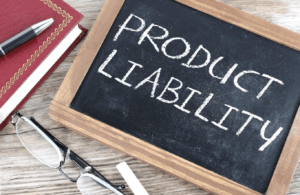Product Liability: Background on the Practice Area and What to Do if you are Injured by a Defective Product

Photo Courtesy of Picpedia.org
We use a wide variety of products on a daily basis, and as consumers, we expect these products to easily complete the functions for which they were made. However, in certain instances, consumers purchase or use a product that was defectively manufactured, and they may even suffer an injury from that product. In an effort to hold manufacturers accountable for their errors, many Americans resort to filing product liability lawsuits against companies for their defective products. Today, our blog provides a general overview of product liability law and uses two case studies to show the varying scope and foundations of these types of matters. The post then concludes with a brief set of tips for those who have been injured as a result of using a defective product.
Background on Product Liability Cases
Product liability law is a type of civil law that aims to compensate individuals who have suffered some sort of injury from a defective product. Defects are generally placed in one of three categories: manufacturing defects, design defects, and failures to warn. Manufacturing defects occur when a manufacturer has a safe product design but makes a mistake during the manufacturing process. Alternatively, design defects occur when the manufacturer’s design plan included some unsafe aspect that made the product unreasonably dangerous. Design defects can be difficult to prove, as they concern the manufacturer’s intentional conduct and sometimes force the plaintiff to offer an alternative manufacturing plan that would have been safer. Finally, failure to warn cases are those in which the manufacturer breached its duty to warn consumers of some foreseeable danger involved in using the product.
If a plaintiff files a product liability suit under a “failure to warn” theory, their legal claim would be framed in terms of the manufacturer’s alleged breach of a warranty. Outside of these types of allegations, typical product liability claims (based on either manufacturing or design defects) proceed under either a negligence or strict liability standard. Under a traditional negligence standard, a plaintiff would need to prove that: (1) the defendant had some duty of care towards the plaintiff; (2) the defendant breached that duty; and (3) the defendant’s breach caused the plaintiff’s injury. On the other hand, strict liability assumes that a defendant is liable for any defective product that they place into the market. Therefore, plaintiffs pursuing a claim under a strict liability standard in Illinois need only prove: “(1) a condition of the product as a result of manufacturing or design; (2) that made the product unreasonably dangerous; (3) that existed at the time the product left the defendant’s control; and (4) an injury to the plaintiff; (5) that was proximately caused by the condition.” Cassidy v. China Vitamins, LLC, 89 N.E.3d 944, 949 (2017).
Case Studies on Product Liability Litigation
Product liability cases can vary significantly in terms of their scope, settlement potential, and product in question. For example, in June 2020, Bayer – the parent company of Roundup – settled a massive product liability action over claims that Roundup Weed Killer caused non-Hodgkins lymphoma. Through this deal, Bayer settled approximately 125,000 claims against the company for a total of up to $10.9 billion. Plaintiffs filed a litany of separate lawsuits against Bayer and Roundup’s former parent company, Monsanto, alleging both a design defect (i.e., that Roundup was improperly manufactured) and that Monsanto breached its duty of care by failing to warn consumers of the risk of developing cancer after using Roundup. Though there are still various Roundup-related cases currently ongoing in American courts, this $10.9 billion settlement ranks as one of the highest product liability settlements in history.
Conversely, there can also be product liability cases covering a more niche product in a smaller market, while still posing a serious threat to the manufacturer. For instance, in February 2020, a New Jersey man received a $2 million settlement after taking a dietary supplement that caused liver failure. Specifically, in 2013 Plaintiff Benjamin Viloria started taking “OxyElite,” a supplement that promised to assist in gaining muscle and losing weight. However, by November 2013, OxyElite manufacturer USP Labs of Dallas began recalling the product due to potential “adverse health consequences.” Shortly thereafter, Viloria obtained medical confirmation that his liver was failing due to OxyElite and subsequently filed a lawsuit in New Jersey state court. Viloria’s lawsuit was temporarily stalled to allow the U.S. Department of Justice to pursue criminal charges against USP Labs, but soon after the DOJ’s criminal investigation concluded, Viloria secured his $2 million settlement.
Tips for Victims Injured by a Defective Product
In the event of an injury caused by a defective product, it can be helpful to know a few basic tips about what actions to take after the accident to maximize the potential of your legal claim. While the time immediately following an accident can be understandably traumatic, the truth is that these moments can be pivotal to a victim’s chances of recovering damages in the future. Here are a few tips for victims of product-related injuries on how to act in the moments after the accident:
- Seek medical attention. Your health is the top priority, so seeking medical attention should always be the first step after an accident. Obtaining the appropriate medical treatment for injuries is also an essential component of any injury-related case. Therefore, it is important to not only seek immediate medical treatment after the incident, but also to follow your doctor’s advice and attend as many medical appointments as necessary.
- Take pictures and videos. Images of the accident scene can be a very helpful piece of evidence for almost all personal injury cases, and product liability is no exception. If possible, you should take pictures and videos of all relevant surroundings near the scene of the accident. Relevant images could include your injuries, the product itself, or the area nearby the accident.
- Collect witness information. Witness testimony confirming your account of the incident can be a valuable component of a product liability case. Therefore, you should try to write down the names and contact information of anyone who witnessed the injury. If they had a clear view of the accident, these witnesses may end up providing key statements for your case.
- Preserve key evidence. As the case progresses, you should keep copies all of accident-related documents. Examples of such documents could include accident reports, witness statements, medical records, or any notes taken regarding the injury.
- Consult an attorney. Contacting an experienced product liability attorney can help you understand the nuances and scope of your potential claim. Attorneys with knowledge and first-hand experience working on product liability cases – such as the legal team at Coffman Law – can typically provide a free consultation to discuss the potential of your case.
If any readers have suffered any injury due to a dangerous or defective product, do not hesitate to reach out to Coffman Law. Owner and Founding Partner Brian Coffman has handled a number of high-profile product liability matters, and through his experience seeking justice for injury victims for over 10 years, Brian has also come to understand the strategies typically employed by defendants in these types of cases. Click HERE to contact our office for a free consultation.
About Coffman Law Offices, P.C.
Coffman Law is Chicago’s leading personal injury law firm and is committed to providing superb legal representation for people who are suffering from severe personal injuries or are dealing with the loss of a loved one due to negligence or misconduct. Coffman Law is results-driven law firm focused on ensuring that clients receive the compassion, attention, and consideration that they need to seek adequate compensation for injuries or loss. The firm is led by Owner and Founding Partner Brian Coffman, who has dedicated his career to helping accident victims navigate the legal system and obtain compensation for their injuries. If you have been injured or lost a loved one, contact Coffman Law today for a free consultation.




